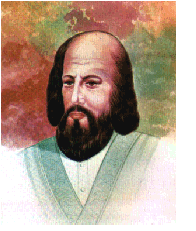Born in Tus, in today’s Iran, Abu Hamid Al-Ghazzali (1058–1111) became a highly influential figure in Islamic philosophy and theology. He was appointed as a professor at Nizamiyah University in Baghdad, one of the greatest universities in the world at the time—when universities barely existed in the Christian west. He was later to leave the University in order to devote his time to reflection and writing. Al-Ghazzali’s writings built on ancient Greek philosophical and scientific thought, whilst also rejecting significant aspects of it. He wanted to balance reason and science with a faith in God, also arguing that reason alone was not sufficient because the deepest truths could only be gained by a faith in God. Al-Ghazzali explains why the most fundamental knowledge has to come from God.

I proceeded … to consider the evidence of my senses and the requirements of reason to see if I could make myself doubt these. This led me to lose faith in the evidence of my senses. This doubt, which became … pervasive, can be expressed as follows:
How can one trust the evidence of one’s senses? Sight is the most powerful of our senses, and we could stare at a shadow and judge that it is fixed and to moving at all … at the end of an hour’s watching, we find that the shadow has moved, not all at once, but gradually … and never was in a state of rest. The eye looks at a star and sees it reduced to the size of a coin, whereas geometrical computations show it to be larger than the earth. This and similar cases exemplify how evidence of one’s senses leads one to a judgment which reason shows irrefutably to be totally erroneous …
I told myself that there is no security even in the evidence of one’s senses. Perhaps such surety can be found only in intellectual truths which play the role of first principles of thought, such as ten is greater than three; the same thing cannot be affirmed and denied; nothing here below can be both created and eternal, existent and non-existence, necessary and impossible. I told myself that when one is asleep one believes all sorts of things and finds oneself in all sorts of situations … When one wakes up, one realizes the inconsistency and inanity of the phantasms of the imagination. In the same way, one might ask oneself about the reality of beliefs one has acquired through one’s senses or by logical thought … Being awake would be like the dreams of that state, which in turn show that the illusion (of the certainty) of rational knowledge is nothing but vain imagination.
Such a state might be the one that the mystics … claim, for they assert that when they become totally absorbed in themselves and completely abstract from their senses they find themselves in a state of mind which does not agree with what is given by reason.
[R]easoning … is impossible without recourse to the first principles of knowledge … Anyone who believes that unveiling of the truth is the fruit of well-ordered arguments belittles the immensity of divine mercy. God’s messenger [Mohammed]—peace be upon him—was asked about spiritual expansion of the senses in which is found the word of God: … He said, ‘It is a light which God the Almighty throws upon the heart’ … It is to this light that one should look for inspiration … [K]now that in the quest of truth one must strive for perfection, even to the point of seeking the unseekable. Primary truths have no need of being sought because they are present in the mind. What is present will disappear when you seek it, but one who seeks the unseekable will not be suspected of having been negligent in seeking what can be sought …
In human life, the intelligence is only one stage in which a person gains a new faculty of perception which allows him to take in all kinds of rational knowledge and things unknown to the realm of the senses. It is similar with prophets, who have, as it were, an extra eye which can perceive things which are invisible and beyond rational understanding … [E]veryone knows that there are more things than can be understood by the intellect alone. This is the case in medicine and astronomy. One who studies either of these soon sees that he needs the help of inspiration and guidance from God the Almighty, and that he cannot gain this knowledge from his own experience! There are laws in astronomy that are verifiable only once every thousand years; how could one verify these personally? It is similar with the properties of medicines.
This shows that there are ways of knowing these phenomena in addition to perceiving them with one’s own intellect, and that is precisely what prophecy is. But knowledge of things unknowable to the intellect is only one of the numerous aspects of prophecy, only one drop from its ocean.
Al-Ghazzali, Abu Hamid. 1108 (2001). Deliverance from Error and Mystical Union with the Almighty. Washington, D.C.: Council for Research in Values and Philosophy. pp.65–67, 98. || WorldCat
